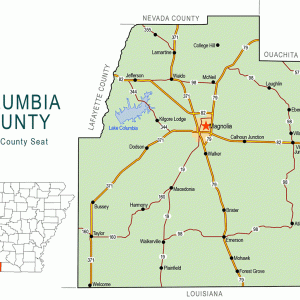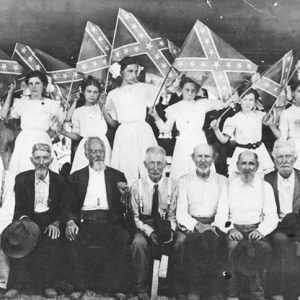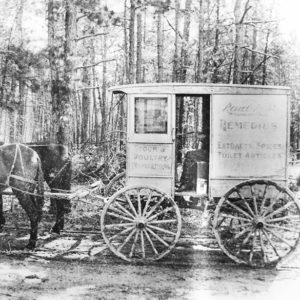calsfoundation@cals.org
McNeil (Columbia County)
| Latitude and Longitude: | 33º20’52″N 093º12’36″W |
| Elevation: | 331 feet |
| Area: | 1.27 square miles (2020 Census) |
| Population: | 381 (2020 Census) |
| Incorporation Date: | February 12, 1884 |
Historical Population as per the U.S. Census:
|
1810 |
1820 |
1830 |
1840 |
1850 |
1860 |
1870 |
1880 |
1890 |
1900 |
|
– |
– |
– |
– |
– |
– |
– |
– |
294 |
260 |
|
1910 |
1920 |
1930 |
1940 |
1950 |
1960 |
1970 |
1980 |
1990 |
2000 |
|
482 |
448 |
460 |
694 |
597 |
746 |
684 |
725 |
686 |
662 |
|
2010 |
2020 |
|
|
|
|
|
|
|
|
|
516 |
381 |
|
|
|
|
|
|
|
|
The community of McNeil in Columbia County emerged as a railroad depot in the 1880s. Just to the east of the community is Logoly State Park.
One of the earliest families of European descent to settle the area was that of Ananias Godbold in 1845. Milton G. Kelso purchased two lots of Columbia County land on March 1, 1855, adding three additional lots five years later. Around 1855, William B. McNeill—a graduate of the University of North Carolina—arrived in the area and opened a school. McNeill married Mary Jane Kelso on December 21, 1859, and other families settled around the school, so that by the time of the Civil War, the area could be described as “thickly settled.” Because of the school, the settlement was called College Hill, although evidently earlier it had been named Godbold.
No significant Civil War events took place in the area, and it remained quiet until 1883, the year the Cotton Belt Railroad completed a line that crossed Columbia County between the county seat, Magnolia, College Hill to the north. The depot erected was given the name McNeil (with slightly different spelling) in memory of William McNeill, and the same name was given to the second-class city that was incorporated on February 12, 1884. By March 1886, the city was home to eight businesses, and soon a lumber mill and two hotels were added. McNeil was a major shipping point for the lumber industry in Columbia County until the railroad was completed to Magnolia some years later.
A newspaper named the Columbian was founded in 1903 in McNeil by D. B. Langford, and R. L. Westbrook opened the Bank of McNeil in 1906 with $50,000 to back his investors. A baseball team was also formed in the logging community, which held roughly equal numbers of white families and African-American families. Sources say that, during World War I, the black citizens of McNeil were particularly supportive of the war effort, gathering to hear patriotic speeches and purchasing war bonds.
The timber industry declined during the twentieth century, and although other parts of Columbia County benefited from the discovery of oil and gas fields, the McNeil area held no such riches. The Bank of McNeil closed in 1933, one of many victims of the Great Depression. School consolidation combined McNeil schools with those of Waldo (Columbia County).
McNeil received slight notoriety on March 22, 1942, when three residents of Camp Magnolia (which was home to conscientious objectors during World War II) were threatened by dozens of McNeil citizens while on a visit to the community, during which one was painting pictures, another was writing a poem, and a third was writing a letter. The writings and art were confiscated by authorities and displayed at the police station for a time; some citizens had assumed that images and descriptions of the city were the work of spies seeking to report McNeil’s wartime assets to foreign governments. The three conscientious objectors were returned safely to the camp.
The Magnesia Springs area east of McNeil had become a Boy Scout camp after World War II, but the camp was abandoned in 1967. A state park was planned for the location, but state money was not available to acquire the land. In 1974, the property was bought by the Nature Conservancy, and a cooperation of several agencies allowed Logoly State Park to be opened on May 19, 1978. The name was created from the first two letters of the names of three earlier owners of the property—the Longino, Goode, and Lyle families. The park was Arkansas’s first environmental education state park and is a popular destination for field trips.
According to the 2010 census, McNeil is home to 516 people, including 229 whites, 281 African Americans, and nine Hispanics. It has a few small businesses, including Wood-N-Pencil Inc. (a bookkeeping and tax service), a Quik Stop, and a private club called K-C-B Place. Since 2008, the city of McNeil has held an annual festival each April called Festival on the Rails. Notable figures from McNeil include politician Willie Emmett Atkinson.
For additional information:
Kilgore, Nettie Hicks. History of Columbia County. N.p: Southwest Arkansas Genealogical Society, 1976.
Martel, Glenn G. “Early Days in Columbia County.” Arkansas Historical Quarterly 2 (September 1943): 214–243.
———. “Origin of Columbia’s Place Names Reviewed.” Arkansas Historical Quarterly 11 (Spring 1952): 1–14.
Steven Teske
Butler Center for Arkansas Studies
 Columbia County Map
Columbia County Map  McNeil Veterans Meeting
McNeil Veterans Meeting  Rawleigh Remedies
Rawleigh Remedies 




Comments
No comments on this entry yet.